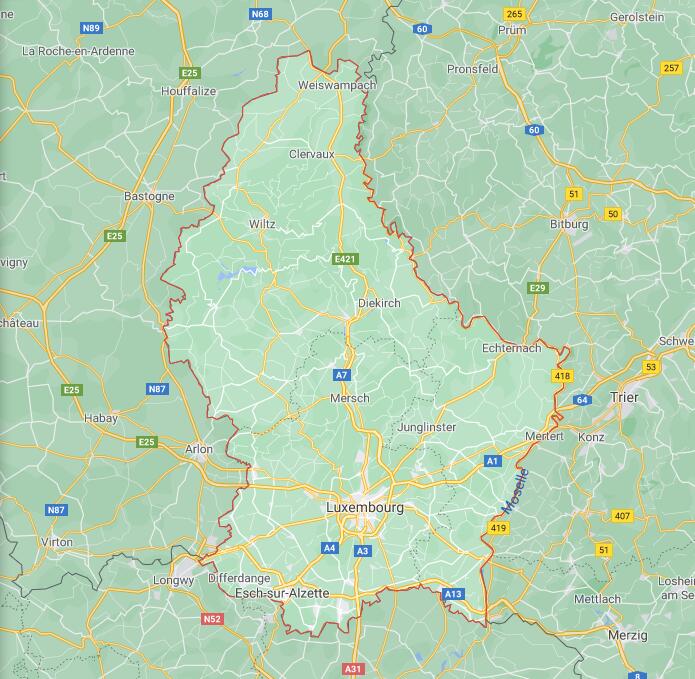
Luxembourg is a small country located in Western Europe, bordered by Belgium, France, and Germany. In 2003, it had an estimated population of 462,000 people and its capital was Luxembourg City. The official languages were French and German with Luxembourgish as the national language. The currency was the Euro. According to computergees, Luxembourg had a constitutional monarchy as its form of government with a Grand Duke as the head of state and a Prime Minister as the head of government.
The economy of Luxembourg in 2003 was largely based on financial services such as banking, insurance, and investments. Other major industries included steel production, chemicals manufacturing, information technology services, rubber products production and automotive components manufacturing. Tourism was also an important sector in the economy with visitors from all over the world coming to experience Luxembourg’s rich culture and heritage.
Education levels were relatively high compared to other countries in the region with almost 100% literacy rate. Healthcare access was also good due to investment in medical services provided by foreign organizations. Security forces were present throughout the country to maintain order but crime levels were still low compared to other countries in the region. Luxembourg maintained strong cultural ties to its neighbors including its unique cuisine as well as traditional music and art forms which have been passed down for centuries. The country also had a vibrant nightlife with a variety of nightclubs, bars and restaurants located throughout Luxembourg City.
Yearbook 2003
Luxembourg. According to Countryaah.com, Luxembourg Independence Day is June 23. Luxembourg joined the criticism of the US-led Iraq war and in April, together with Germany, France and Belgium, launched plans to build their own defense union. The proposal, which included, inter alia, a European defense with defense guarantees and its own military headquarters, received renewed news when the EU’s new constitution was discussed towards the end of the year.
Prosecutors in Luxembourg investigated the details of financial irregularities at the EU statistical office EUROSTAT, which is based in the country. In France, a police investigation was also underway, as well as internally within the EU.
In May 2010, Lithaun’s public prosecutor called on the courts to ban the Baltic Pride parade of the month in the capital Vilnius. The city court initially banned the parade on the grounds that the authorities could not guarantee the security of counter-demonstration attacks, but this ban was subsequently overturned by the Supreme Court following vigorous protests by international human rights organizations. The Baltic countries are generally characterized by considerable homophobia.
The October 2012 parliamentary elections became a disaster for the ruling Conservative party, which lost 12 seats and landed at 33. The victor became the Social Democracy, which went up to 13, up to 38. to 29. In fact, the party became the country’s largest with 19.8% of the vote, while the Social Democrats gained 18.4%, but because of the electoral rules it gave fewer seats.
After the election, the formation of the government was handed over to Social Democrat leader Algirdas Butkevičius, who sought to form a coalition government consisting of his own party, the “Labor Party” and the Law and Order party. However, the president opposed this coalition, pointing out that the “Labor Party” had been implicated in electoral fraud. The police investigated 27 cases of this kind, and most were about Labor Patients candidates who had purchased votes. Butkevičius, however, stuck to his original plan and in December his government was approved in parliament.
In October, an indicative referendum was held on the construction of a new nuclear power plant at Visaginas. The proposal was rejected by 65% of the votes cast. The country’s only nuclear power plant in Ignalinas had been shut down in 2009 by the EU. It was of the same type as the Chernobyl plant and was considered too dangerous. Since then, Lithuania had been heavily dependent on imports of electricity from Russia.
Lithuania gained a seat in the UN Security Council in 2012 and planned to introduce Euro as its currency per year. January 1, 2015.
Grybauskaitė was re-elected as President in May 2014. In the first general election, she got 46.6% of the vote against 13.8% for Socialist Zigmantas Balčytis. In the second round she got 59.1% against 40.9% for Balčytis. In the second round, turnout was only 47.4%.
The country’s relationship with Russia deteriorated drastically during 2014 as a result of the crisis in Ukraine. In November, President called Russia a “terrorist state to be stopped”. She not only stood by her warlike rhetoric, but was backed by both parliament and the media. Lithuania suffered even under the sanctions regime the EU had introduced against Russia. Russia again responded with sanctions against EU goods, which hit Lithuanian agricultural exports severely. The country’s economy shrank by 4% in 2014 as a result of the EU’s political and economic war with Russia. Russia had until then been the country’s main trading partner, accounting for 20-30% of exports and imports.